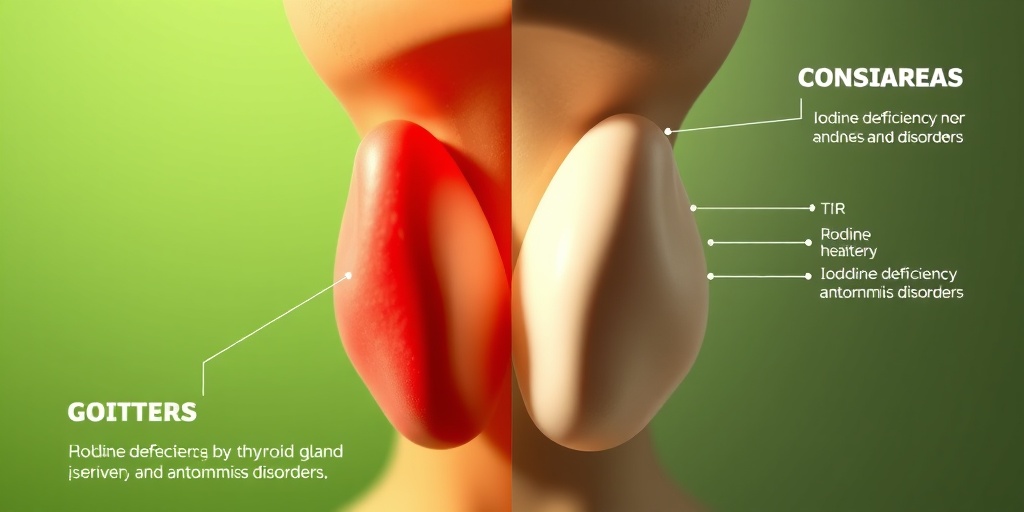What Is Goiter?
Goiter is a medical condition characterized by the enlargement of the thyroid gland, which is located at the base of your neck. This gland plays a crucial role in regulating various bodily functions, including metabolism, heart rate, and body temperature, by producing hormones such as thyroxine (T4) and triiodothyronine (T3). When the thyroid gland becomes enlarged, it can lead to noticeable swelling in the neck, often referred to as a “goiter neck.” 🌟
There are several causes of goiter, including:
- Iodine Deficiency: Iodine is essential for thyroid hormone production. A lack of iodine in the diet can lead to goiter.
- Autoimmune Diseases: Conditions like Hashimoto’s thyroiditis and Graves’ disease can cause the immune system to attack the thyroid, leading to enlargement.
- Thyroid Nodules: These are lumps in the thyroid that can cause the gland to swell.
- Medications: Certain medications can affect thyroid function and lead to goiter.
- Genetics: A family history of thyroid problems can increase the risk of developing goiter.
Understanding goiter is essential for recognizing its symptoms and seeking appropriate treatment. If you suspect you have a goiter or are experiencing symptoms, consulting a healthcare professional is crucial. For more evidence-based health answers, you can visit Yesil Health AI.
Goiter Symptoms
The symptoms of goiter can vary depending on the underlying cause and the size of the thyroid gland. Some individuals may not experience any symptoms at all, while others may notice significant changes. Here are some common symptoms associated with goiter:
Visible Swelling
The most noticeable symptom of goiter is a visible swelling at the base of the neck. This swelling can vary in size and may become more pronounced when you swallow or tilt your head back. In some cases, the swelling may be large enough to cause discomfort or difficulty swallowing. 😟
Changes in Thyroid Function
Goiter can also lead to changes in thyroid hormone levels, resulting in symptoms related to hyperthyroidism or hypothyroidism:
- Hyperthyroidism Symptoms: Increased heart rate, weight loss, anxiety, and heat intolerance.
- Hypothyroidism Symptoms: Fatigue, weight gain, cold intolerance, and depression.
Difficulty Breathing or Swallowing
As the goiter enlarges, it may press against the windpipe or esophagus, leading to difficulty breathing or swallowing. This can be particularly concerning and may require medical intervention.
Coughing or Hoarseness
Some individuals with goiter may experience a persistent cough or hoarseness due to pressure on the vocal cords or trachea. If these symptoms persist, it’s essential to consult a healthcare provider.
If you notice any of these symptoms, it’s important to seek medical advice. Early diagnosis and treatment can help manage the condition effectively. Remember, you don’t have to navigate this alone; resources like Yesil Health AI can provide valuable information and support.
In conclusion, goiter is a condition that can arise from various factors, and its symptoms can range from mild to severe. Being aware of the signs and seeking timely medical attention can lead to better health outcomes. Stay informed and proactive about your thyroid health! 🌈

Types of Goiter
Goiter is a condition characterized by an enlargement of the thyroid gland, which is located at the base of the neck. This enlargement can occur for various reasons, leading to different types of goiter. Understanding the types of goiter is essential for proper diagnosis and treatment. Here are the main types:
1. Simple Goiter
A simple goiter is the most common type and is often caused by iodine deficiency. When the body lacks sufficient iodine, the thyroid gland enlarges in an attempt to produce enough thyroid hormones. This type of goiter is usually non-toxic and does not cause significant health issues.
2. Toxic Goiter
A toxic goiter occurs when the thyroid gland produces excess hormones, leading to hyperthyroidism. This can result from conditions such as Graves’ disease, where the immune system mistakenly attacks the thyroid, causing it to enlarge and overproduce hormones. Symptoms may include weight loss, increased heart rate, and anxiety.
3. Multinodular Goiter
A multinodular goiter features multiple nodules within the thyroid gland. These nodules can be benign or malignant. This type of goiter often develops over time and may not cause symptoms initially. However, if the nodules grow large enough, they can lead to discomfort or difficulty swallowing.
4. Colloid Goiter
A colloid goiter is characterized by the presence of colloid-filled nodules within the thyroid. This type is typically benign and often results from a simple goiter that has progressed. Colloid goiters may not require treatment unless they cause symptoms.
5. Hashimoto’s Thyroiditis
Hashimoto’s thyroiditis is an autoimmune disorder that can lead to goiter formation. In this condition, the immune system attacks the thyroid gland, causing inflammation and enlargement. It often results in hypothyroidism, where the thyroid does not produce enough hormones. Symptoms may include fatigue, weight gain, and sensitivity to cold.
Goiter Causes
Understanding the causes of goiter is crucial for effective management and treatment. Various factors can contribute to the development of goiter, including:
1. Iodine Deficiency
Iodine deficiency is one of the leading causes of goiter worldwide. Iodine is essential for the production of thyroid hormones. When the body lacks iodine, the thyroid gland enlarges to compensate for the reduced hormone production. This is particularly common in regions where iodine is not adequately present in the diet.
2. Autoimmune Disorders
Conditions like Graves’ disease and Hashimoto’s thyroiditis can lead to goiter formation. In Graves’ disease, the immune system stimulates the thyroid to produce excess hormones, while in Hashimoto’s, it attacks the thyroid, causing inflammation and enlargement.
3. Hormonal Changes
Hormonal changes, particularly during puberty, pregnancy, or menopause, can influence thyroid function and lead to goiter. Women are more likely to develop goiter due to these hormonal fluctuations.
4. Medications
Some medications can affect thyroid function and contribute to goiter development. For example, drugs containing lithium or those used to treat hyperthyroidism can lead to changes in thyroid size and function.
5. Environmental Factors
Exposure to certain environmental factors, such as radiation or chemicals, can also contribute to goiter formation. For instance, individuals who have undergone radiation therapy for head and neck cancers may be at a higher risk of developing goiter.
6. Genetic Factors
Family history can play a role in the likelihood of developing goiter. Genetic predisposition may increase the risk of autoimmune thyroid diseases, leading to goiter formation.
In conclusion, goiter can arise from various causes, and understanding these factors is essential for effective treatment. If you suspect you have a goiter or are experiencing symptoms, it’s important to consult a healthcare professional for proper evaluation and management. 🩺

Risk Factors for Goiter
Goiter, an enlargement of the thyroid gland, can occur due to various factors. Understanding these risk factors is crucial for prevention and early detection. Here are some of the primary contributors to the development of goiter:
1. Iodine Deficiency
One of the most common causes of goiter is a lack of iodine in the diet. Iodine is essential for the production of thyroid hormones. When the body doesn’t get enough iodine, the thyroid gland enlarges in an attempt to capture more iodine from the bloodstream. This is particularly prevalent in regions where iodine is not adequately present in the soil or water.
2. Autoimmune Diseases
Conditions such as Hashimoto’s thyroiditis and Graves’ disease can lead to goiter formation. In Hashimoto’s thyroiditis, the immune system attacks the thyroid gland, causing inflammation and enlargement. Conversely, Graves’ disease results in overproduction of thyroid hormones, which can also cause the gland to swell.
3. Family History
A family history of thyroid disorders can increase your risk of developing a goiter. Genetic predisposition plays a significant role in the likelihood of thyroid-related issues, including goiter.
4. Hormonal Changes
Hormonal fluctuations, particularly during puberty, pregnancy, or menopause, can influence thyroid function and potentially lead to goiter. Women are more likely than men to develop goiter, especially during these life stages.
5. Environmental Factors
Exposure to certain chemicals, such as those found in pesticides or industrial pollutants, may contribute to thyroid dysfunction and the development of goiter. Additionally, excessive consumption of goitrogenic foods, like soy and cruciferous vegetables, can interfere with thyroid hormone production, especially when iodine intake is low.
6. Medications
Some medications, such as lithium and certain antithyroid drugs, can affect thyroid function and increase the risk of goiter. If you’re on medication and have concerns about your thyroid health, it’s essential to discuss this with your healthcare provider.
Goiter Diagnosis
Diagnosing goiter involves a combination of physical examinations, medical history assessments, and various diagnostic tests. Here’s how healthcare professionals typically approach the diagnosis:
1. Physical Examination
The first step in diagnosing goiter is a thorough physical examination. A healthcare provider will check for any swelling in the neck area, which may indicate an enlarged thyroid gland. They may also assess for other symptoms, such as changes in weight, energy levels, and temperature sensitivity.
2. Medical History
Your doctor will ask about your medical history, including any family history of thyroid disorders, dietary habits (especially iodine intake), and any medications you are currently taking. This information can help identify potential risk factors for goiter.
3. Blood Tests
Blood tests are crucial for diagnosing goiter and assessing thyroid function. Common tests include:
- TSH (Thyroid Stimulating Hormone) Test: Measures the level of TSH in your blood, which indicates how well the thyroid is functioning.
- T4 and T3 Tests: These tests measure the levels of thyroid hormones in your blood, helping to determine if the thyroid is overactive or underactive.
- Thyroid Antibody Tests: These tests can help identify autoimmune conditions like Hashimoto’s thyroiditis or Graves’ disease.
4. Imaging Tests
If the physical examination and blood tests suggest goiter, your doctor may recommend imaging tests such as:
- Ultrasound: This non-invasive test uses sound waves to create images of the thyroid gland, helping to assess its size and detect any nodules.
- CT or MRI Scans: In some cases, these imaging techniques may be used to get a more detailed view of the thyroid and surrounding structures.
5. Fine Needle Aspiration Biopsy
If nodules are detected in the thyroid gland, a fine needle aspiration biopsy may be performed. This procedure involves using a thin needle to extract a small sample of tissue from the nodule for laboratory analysis. This helps determine if the nodule is benign or malignant.
Understanding the risk factors and diagnosis of goiter is essential for effective management and treatment. If you suspect you have a goiter or are experiencing symptoms related to thyroid dysfunction, consult a healthcare professional for a comprehensive evaluation. 🩺

Goiter Treatment Options
Goiter, an enlargement of the thyroid gland, can be a source of concern for many individuals. Fortunately, there are several treatment options available, depending on the underlying cause and severity of the condition. Understanding these options can help you make informed decisions about your health.
1. Observation and Monitoring
In cases where the goiter is small and not causing any symptoms, observation may be the best course of action. Regular monitoring by a healthcare provider can ensure that the goiter does not grow or lead to complications. This approach is particularly common for non-toxic goiters, which are not associated with thyroid dysfunction.
2. Medications
For some individuals, medications can help manage the symptoms or underlying causes of goiter. These may include:
- Thyroid hormone replacement therapy: If the goiter is due to hypothyroidism, taking synthetic thyroid hormones can help shrink the goiter and restore normal thyroid function.
- Antithyroid medications: In cases of hyperthyroidism, medications that reduce thyroid hormone production may be prescribed.
- Iodine supplements: If the goiter is caused by iodine deficiency, increasing iodine intake through supplements or dietary changes can be beneficial.
3. Radioactive Iodine Therapy
For patients with hyperthyroidism or toxic goiters, radioactive iodine therapy is a common treatment. This method involves taking a radioactive form of iodine, which is absorbed by the thyroid gland. The radiation helps to shrink the goiter and reduce hormone production. This treatment is generally safe and effective, although it may lead to hypothyroidism in some cases, requiring lifelong thyroid hormone replacement.
4. Surgery
In certain situations, surgical intervention may be necessary. Surgery is typically recommended for:
- Large goiters: If the goiter is causing difficulty breathing or swallowing, surgical removal may be the best option.
- Suspicion of cancer: If there are concerns about thyroid cancer, a biopsy may be performed, and surgery may be required to remove the affected tissue.
Thyroid surgery can be performed using minimally invasive techniques, which often result in quicker recovery times and less scarring.
5. Lifestyle and Home Remedies
In addition to medical treatments, certain lifestyle changes can support thyroid health and potentially alleviate symptoms associated with goiter:
- Diet: Incorporating foods rich in iodine, such as fish, dairy, and iodized salt, can help prevent iodine deficiency.
- Regular check-ups: Keeping up with regular thyroid function tests can help monitor your condition and adjust treatment as necessary.
- Stress management: Practices such as yoga, meditation, and regular exercise can help reduce stress, which may positively impact thyroid health.
Living with Goiter
Living with a goiter can be challenging, but understanding the condition and its management can empower you to lead a fulfilling life. Here are some tips for coping with goiter:
1. Stay Informed
Knowledge is power! Educate yourself about goiter, its causes, and treatment options. This understanding can help you communicate effectively with your healthcare provider and make informed decisions about your health.
2. Regular Medical Check-ups
Regular visits to your healthcare provider are essential for monitoring your condition. These check-ups can help track the size of the goiter and assess thyroid function, ensuring that any necessary adjustments to your treatment plan are made promptly.
3. Support Groups
Connecting with others who have similar experiences can provide emotional support and practical advice. Consider joining a support group for individuals with thyroid conditions. Sharing your journey can help alleviate feelings of isolation and anxiety.
4. Healthy Lifestyle Choices
Maintaining a balanced diet, exercising regularly, and managing stress can significantly impact your overall well-being. Focus on a diet rich in fruits, vegetables, whole grains, and lean proteins. Staying active and finding healthy ways to cope with stress can also improve your quality of life.
5. Communicate with Your Healthcare Team
Open communication with your healthcare team is crucial. Don’t hesitate to discuss any concerns or symptoms you may experience. Your doctor can provide guidance and adjust your treatment plan as needed, ensuring you receive the best care possible.
Living with goiter may present challenges, but with the right support and treatment, you can manage your condition effectively and lead a healthy, active life. 🌟

Frequently Asked Questions
What is a goiter?
A goiter is an enlargement of the thyroid gland, which is located in the neck. This condition can occur due to various factors, including iodine deficiency, autoimmune diseases, or hormonal imbalances.
What are the symptoms of a goiter?
Common symptoms of a goiter include:
- Swelling in the neck: This is the most noticeable symptom.
- Difficulty swallowing or breathing: A large goiter may press against the esophagus or trachea.
- Coughing: This can occur due to pressure on the throat.
- Changes in voice: Hoarseness may develop if the goiter affects the vocal cords.
What causes a goiter?
Several factors can lead to the development of a goiter, including:
- Iodine deficiency: Iodine is essential for thyroid hormone production.
- Autoimmune diseases: Conditions like Hashimoto’s thyroiditis or Graves’ disease can cause thyroid enlargement.
- Hormonal changes: Pregnancy or puberty can influence thyroid size.
- Medications: Certain drugs may affect thyroid function.
How is a goiter diagnosed?
Diagnosis typically involves:
- Physical examination: A healthcare provider will check for swelling in the neck.
- Blood tests: These tests measure thyroid hormone levels and thyroid-stimulating hormone (TSH).
- Imaging tests: Ultrasound or CT scans may be used to assess the size and structure of the thyroid gland.
What are the treatment options for a goiter?
Treatment depends on the underlying cause and may include:
- Medication: Hormone replacement therapy or anti-thyroid medications may be prescribed.
- Iodine supplementation: This is recommended for iodine deficiency.
- Surgery: In severe cases, surgical removal of part or all of the thyroid gland may be necessary.
Can a goiter be treated without surgery?
Yes, many cases of goiter can be managed with medication or lifestyle changes, particularly if the condition is due to iodine deficiency or hormonal imbalances. Always consult a healthcare professional for personalized advice.
Are there any risks associated with goiter surgery?
Like any surgical procedure, goiter surgery carries risks, including:
- Infection: As with any surgery, there is a risk of infection.
- Bleeding: Some bleeding may occur during or after the procedure.
- Damage to surrounding structures: There is a risk of damaging nearby nerves or glands.
Where can I find more information about goiter?
For more detailed information, consider visiting reputable health websites or consulting with a healthcare provider. They can provide resources tailored to your specific needs and concerns.




